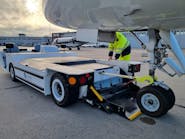Washington, DC, July 20, 2011 – The nation's leading general aviation organizations on Tuesday, July 19, 2011, sent a joint letter to all members of the U.S. House and Senate, urging them to abandon a proposal to charge a $25 "departure fee" on both airline and general aviation flights.
In the letter, the presidents of the National Business Aviation Association (NBAA), the Aircraft Owners and Pilots Association (AOPA), the Experimental Aircraft Association (EAA), the General Aviation Manufacturers Association (GAMA), the Helicopter Association International (HAI) and the National Air Transportation Association (NATA) tell the legislators: "Our community is deeply concerned about reports suggesting that current negotiations to raise the debt ceiling are giving rise to a resoundingly discredited approach to raising revenues from our industry — user fees."
The entire general aviation industry believes that the current fuel excise tax system is the most efficient and effective way for general aviation to contribute to the aviation trust fund. Experience elsewhere in the world, on the other hand, demonstrates that user fees cripple general aviation, doing irreparable harm to a vital economic driver.
"As policymakers have thoroughly reviewed the idea of user fees in recent years, the general aviation community has consistently said that we should not try to adopt foreign-style user fees, but should instead build upon the time-tested and proven fuel-tax system," said NBAA President and CEO Ed Bolen. "This pay-at-the-pump mechanism is the best – and should remain the exclusive – means for the industry to meet its tax obligations."
"Bad ideas, like bad pennies, have a habit of turning up again and again in Washington," said AOPA President and CEO Craig L. Fuller. "User fees are a bad idea that hurts an entire industry, the economy, and the nation. They simply make no sense. Time and again we've seen that they stifle aviation and compromise safety."
"GA already pays its fair share and then some for the small segment of the national airspace system that it uses," said Rod Hightower, EAA President/CEO. "A user fee system will not only create an expensive and unnecessary federal bureaucracy, but also instantly hinder the growth of general aviation and drive more job losses in our country."
"Now is not the time to revisit the bad idea of user fees," said Matthew S. Zucaro, president of HAI. "Such a detrimental initiative will only result in a debilitating effect on the helicopter community. Helicopters perform missions on a daily basis for the greater good of society — such as emergency medical transport, aerial firefighting, law enforcement, search and rescue, disaster relief, national security, and counterterrorism. Helicopter operators already pay more than their fair share when one considers their minimal impact on the ATC infrastructure. Enough is enough."
"It is time for everyone to take a collective deep breath and make certain that changes are not made on the fly that hurt general aviation's economic recovery," said GAMA's President and CEO Pete Bunce. "User fees have crippled general aviation in Europe and the last thing we want to see in the U.S. is user fees growing the federal bureaucracy."
"Instead of embracing the economic growth and jobs this great industry provides to the U.S., the President continues to vilify our community," stated NATA President & CEO James K. Coyne. "It's time for this Administration to cease any and all consideration of a user fee system for a general aviation community that is still recovering from the recession."
In their letter, the leaders conclude, "We urge you not to create an expensive new federal collection bureaucracy that will need to be funded on the backs of general aviation operators in the name of deficit reduction. It is a nonsensical and self-defeating approach. "For general aviation, fuel taxes work – user fees do not. There has to be a way for our industry to pay at the pump rather than creating a new federal collection bureaucracy. Please do not destroy a great national asset and critical industry."




